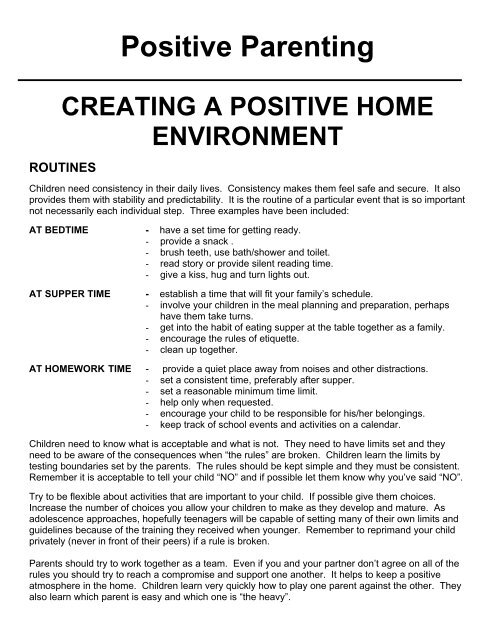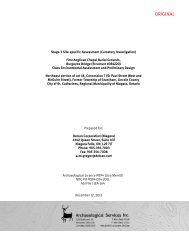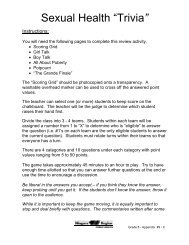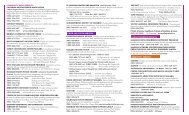Creating a Positive Home Environment
Creating a Positive Home Environment
Creating a Positive Home Environment
You also want an ePaper? Increase the reach of your titles
YUMPU automatically turns print PDFs into web optimized ePapers that Google loves.
<strong>Positive</strong> Parenting<br />
CREATING A POSITIVE HOME<br />
ENVIRONMENT<br />
ROUTINES<br />
Children need consistency in their daily lives. Consistency makes them feel safe and secure. It also<br />
provides them with stability and predictability. It is the routine of a particular event that is so important<br />
not necessarily each individual step. Three examples have been included:<br />
AT BEDTIME - have a set time for getting ready.<br />
- provide a snack .<br />
- brush teeth, use bath/shower and toilet.<br />
- read story or provide silent reading time.<br />
- give a kiss, hug and turn lights out.<br />
AT SUPPER TIME - establish a time that will fit your family’s schedule.<br />
- involve your children in the meal planning and preparation, perhaps<br />
have them take turns.<br />
- get into the habit of eating supper at the table together as a family.<br />
- encourage the rules of etiquette.<br />
- clean up together.<br />
AT HOMEWORK TIME - provide a quiet place away from noises and other distractions.<br />
- set a consistent time, preferably after supper.<br />
- set a reasonable minimum time limit.<br />
- help only when requested.<br />
- encourage your child to be responsible for his/her belongings.<br />
- keep track of school events and activities on a calendar.<br />
Children need to know what is acceptable and what is not. They need to have limits set and they<br />
need to be aware of the consequences when “the rules” are broken. Children learn the limits by<br />
testing boundaries set by the parents. The rules should be kept simple and they must be consistent.<br />
Remember it is acceptable to tell your child “NO” and if possible let them know why you’ve said “NO”.<br />
Try to be flexible about activities that are important to your child. If possible give them choices.<br />
Increase the number of choices you allow your children to make as they develop and mature. As<br />
adolescence approaches, hopefully teenagers will be capable of setting many of their own limits and<br />
guidelines because of the training they received when younger. Remember to reprimand your child<br />
privately (never in front of their peers) if a rule is broken.<br />
Parents should try to work together as a team. Even if you and your partner don’t agree on all of the<br />
rules you should try to reach a compromise and support one another. It helps to keep a positive<br />
atmosphere in the home. Children learn very quickly how to play one parent against the other. They<br />
also learn which parent is easy and which one is “the heavy”.
Consequences<br />
There are natural and logical consequences. These consequences can be a good way for a child to<br />
learn from his/her mistakes. Natural consequences are those that occur as a direct result of doing<br />
or not doing something. An example would be that if you leave your bike out in the rain it will rust.<br />
Not all situations are appropriate for natural consequences such as allowing your toddler to run out on<br />
the road.<br />
Logical consequences are often established ahead of time and are related to the problem. An<br />
example would be that if your child is caught riding his/her bike without a helmet then the bike is<br />
taken away for a couple of days.<br />
Stress<br />
Children are constantly under stress. Situations that don’t appear to be stressful to adults will often<br />
cause children to feel pressured or anxious. When routines are disrupted because of a late night or<br />
lack of exercise stress is created. These stressful times can cause negative behavioural traits to<br />
appear.<br />
Stress can occur when children’s lives become too hectic. Belonging to several clubs, sports<br />
activities or lessons can cause anxiety and pressure. Children need time to relax and spend quiet<br />
evenings at home. It’s during these unstructured times that imaginations develop and children<br />
unwind.<br />
Limit the amount of TV viewing that occurs in your household. An hour per day is adequate. By<br />
limiting the amount of time the TV is on you’ll find that communication between family members<br />
improves. Children become more creative, interested in reading, doing homework and playing<br />
games.<br />
Occasionally, plan a special family activity such as ordering pizza for supper or playing a game of<br />
cards.<br />
TIP: A positive environment is one in which children feel safe<br />
and secure. They need to feel loved and to be told they are<br />
loved. Everyone needs to be hugged. Teenagers especially<br />
need a hug when they’re feeling out of sorts. When using<br />
praise it must be sincere and genuine. Children can tell if the<br />
compliment is not deserved. Avoid the use of sarcasm.






